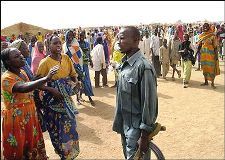Darfur’s displaced people find it hard to trust Khartoum
By RAWYA RAGEH, Associated Press Writer
KASS, Sudan, Sep 16, 2004 (AP) — Noora Adam said Darfur’s Janjaweed Arab militia backed by government bombers killed 10 of her siblings.
 Now, she is one of at least 10,000 displaced people huddled in ragged tents of sticks and plastic bags at Otash camp in South Darfur. Trusting Khartoum is “just not possible,” she said Wednesday.
Now, she is one of at least 10,000 displaced people huddled in ragged tents of sticks and plastic bags at Otash camp in South Darfur. Trusting Khartoum is “just not possible,” she said Wednesday.
“We were not only attacked by fighters on horses and camels, but also ones in planes,” Adam, 35, said. “Government planes.” As she spoke, children around her gestured with their hands to indicate bombs falling from the skies and repeated “planes, planes.”
The Sudanese government rejects accusations it backs the Janjaweed’s scorched earth campaign to remove African farmers from Darfur following a rebel uprising against the government that began in February 2003. The rebels are drawn from the region’s ethnic Africans.
The United States has labeled the crisis genocide. The United Nations estimates that over 50,000 people have died, most as a result of humanitarian crisis sparked by the violence, and more than 1.2 million people have fled their homes.
In an acknowledgment it needs to restore the faith of people like Adam, Khartoum has taken steps such as appointing new local officials. South Darfur Governor Al-Haj Atalmannan Idris, in office three months, replaced a man accused by many of siding with the Arab militias.
Idris, in an interview Wednesday, acknowledged there have been human rights abuses, such as rape, but described them as “individual cases.” He called on the international community to help train his policemen and government workers to deal with rape victims and in hunting down rapists.
The government is organizing a reconciliation meeting between the various tribes Friday, Idris said.
In a crackdown on the Janjaweed, more than 80 fighters were arrested, and at least 30 were prosecuted by a special tribunal, he added.
The Sudanese government is under increasing pressure to do more to reverse what the United Nations has called the world’s worst humanitarian disaster. the international community, though, is divided on how to proceed.
At the United Nations, the United States faced opposition from China, Russia and other Security Council members to its latest draft resolution threatening oil sanctions against Sudan if the government doesn’t quickly rein in the Janjaweed.
The resolution was the only subject discussed at the council’s monthly luncheon Wednesday with Secretary-General Kofi Annan. Diplomats said there were deep divisions among the 15 members on how to pressure the Sudanese government.
The United States circulated a revised draft Tuesday that softened language in the original text but still threatened to consider sanctions, including against Sudan’s petroleum sector. Sudan began exporting oil in 1999 and produces an estimated 250,000 barrels per day. Others, though, question whether it would be productive to push Sudan too hard.
Khartoum insists it is doing all it can to improve security and the humanitarian and human rights situation and points to its commitment to peace talks with the rebels hosted by Nigeria as a sign of its good faith.
Wednesday, a rebel faction said the peace talks had collapsed after three weeks. But all sides — Sudan’s government, and Darfur’s two rebel movements — said they would abide by an African Union proposal to wait at least three weeks before any resumption of negotiations.
Last-round talks late Monday had focused on trying to get both sides to sign an accord on humanitarian access to an estimated 1.2 million refugees from Darfur’s conflict. The rebels said they would not sign any partial accord until the government agrees to disarm the Janjaweed and to allow an international probe into Janjaweed war crimes.
